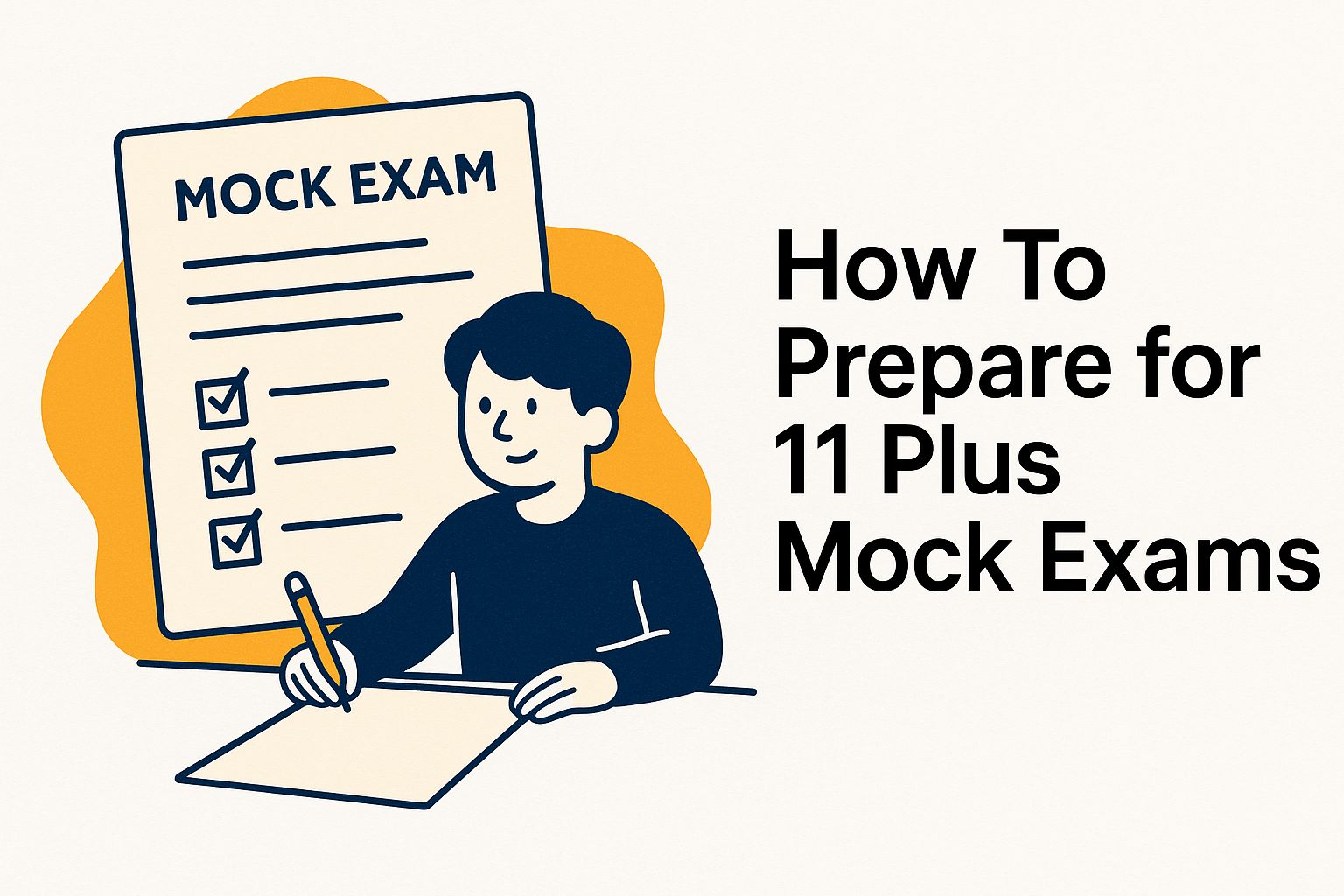
How To Prepare for 11 Plus Mock Exams
Feeling the pressure as 11 Plus mock exams approach? You’re not alone! Preparing effectively can set the stage for success, but where do you start? Understanding the exam format, creating a solid study plan, and discovering the right resources are key steps.
Plus, mastering time management can give you that extra edge. Let’s dive into these essential tips to ensure you’re fully ready for the challenge ahead!
What are 11 Plus Mock Exams?
Mock exams for the 11 Plus are practice tests designed to replicate the conditions of the actual exam. They typically cover subjects such as English, mathematics, verbal reasoning, and non-verbal reasoning.
These exams usually last around two and a half hours, with time evenly distributed among the various subjects. Each section consists of multiple-choice questions, which assess students’ comprehension and problem-solving abilities.
To prepare effectively, students should utilise resources like past papers from tutoring centres to become familiar with the timing and types of questions they will encounter.
Online platforms such as Bond Online and CPG Books provide practice exams specifically tailored to the 11 Plus requirements, ensuring a thorough review of areas that may need improvement.
Importance of Mock Exams in Preparation
Mock exams play a vital role in the preparation process, as they enable students to identify their strengths and weaknesses, which leads to more focused study efforts.
Beyond just highlighting areas that require improvement, mock exams also provide students with the opportunity to practise time management under actual exam conditions. Research indicates that students who engage in practice testing can increase their scores by an average of 10-20%.
Utilising tools such as ExamSoft or Quizlet allows for the creation of customised mock exams, facilitating repetitive practice.
Additionally, reviewing incorrect answers after the exam promotes a deeper understanding of the material. By incorporating these exams into a study plan, students can significantly enhance both their confidence and performance when it truly counts.
Understanding the 11 Plus Exam Format
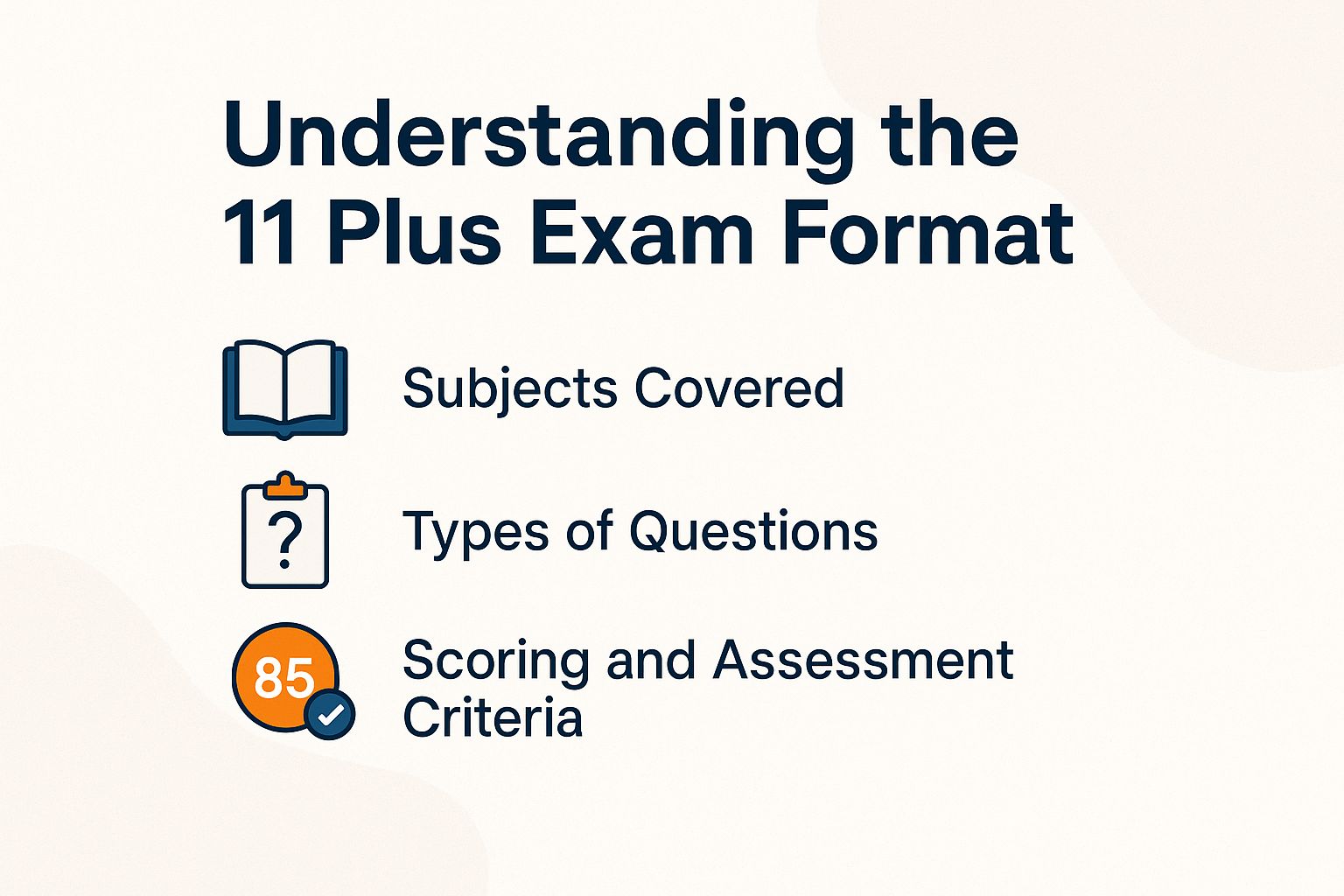
Understanding the format of the 11 Plus exam is essential for effective preparation. This knowledge provides clarity on the subjects that will be tested and the types of questions that candidates can expect to encounter (learn more about the specific format of the 11 Plus exam).
Subjects Covered
The 11 Plus exam generally encompasses four primary subjects: English, mathematics, verbal reasoning, and non-verbal reasoning, each of which plays a significant role in the overall assessment. It is essential to understand the specific skills evaluated within each subject to prepare effectively.
In English, students are required to exhibit both comprehension and writing skills, which are often assessed through comprehension passages and essay tasks. Mathematics emphasises problem-solving, numerical proficiency, and arithmetic operations.
Verbal reasoning focuses on critical thinking and the ability to discern relationships between words, while non-verbal reasoning evaluates logical reasoning through shapes and patterns. By prioritising these skills, students can significantly improve their performance.
To aid in this endeavour, utilising resources such as past exam papers or seeking specialised tutoring can help identify areas for improvement.
Types of Questions
Being familiar with the various types of questions—such as multiple choice, open-ended, and comprehension—can greatly influence one’s performance in tests.
To approach multiple-choice questions effectively, it is advisable to read through all the options before making a selection. This helps to prevent any hasty errors.
Regarding open-ended questions, taking a moment to outline your thoughts can be beneficial, ensuring that your responses are both focused and well-organised.
Comprehension questions require you to summarise the main ideas from a given passage; therefore, highlighting key points and practising active reading strategies is essential.
For instance, if you are preparing for a literacy exam, utilising tools like Quizlet can be helpful for practising both multiple-choice and open-ended questions.
Committing at least 30 minutes each day to this preparation can significantly enhance your understanding and retention of the material.
Scoring and Assessment Criteria
Understanding the scoring system of the 11 Plus exam is crucial, as it significantly influences preparation strategies and goal setting. The 11 Plus exam typically assesses students across several subjects, which include English, mathematics, verbal reasoning, and non-verbal reasoning.
Each subject is scored out of a total of 140 marks, with the usual passing mark hovering around 120, although this can differ from one school to another. To prepare effectively, students should concentrate on practice papers that closely resemble the actual exam format.
Utilising resources like CEM (Centre for Evaluation and Monitoring) practice materials and online platforms such as Bond Online can provide students with tailored practice opportunities. Additionally, conducting regular assessments is a helpful way to gauge readiness and pinpoint areas that may require further improvement.
Creating a Study Plan
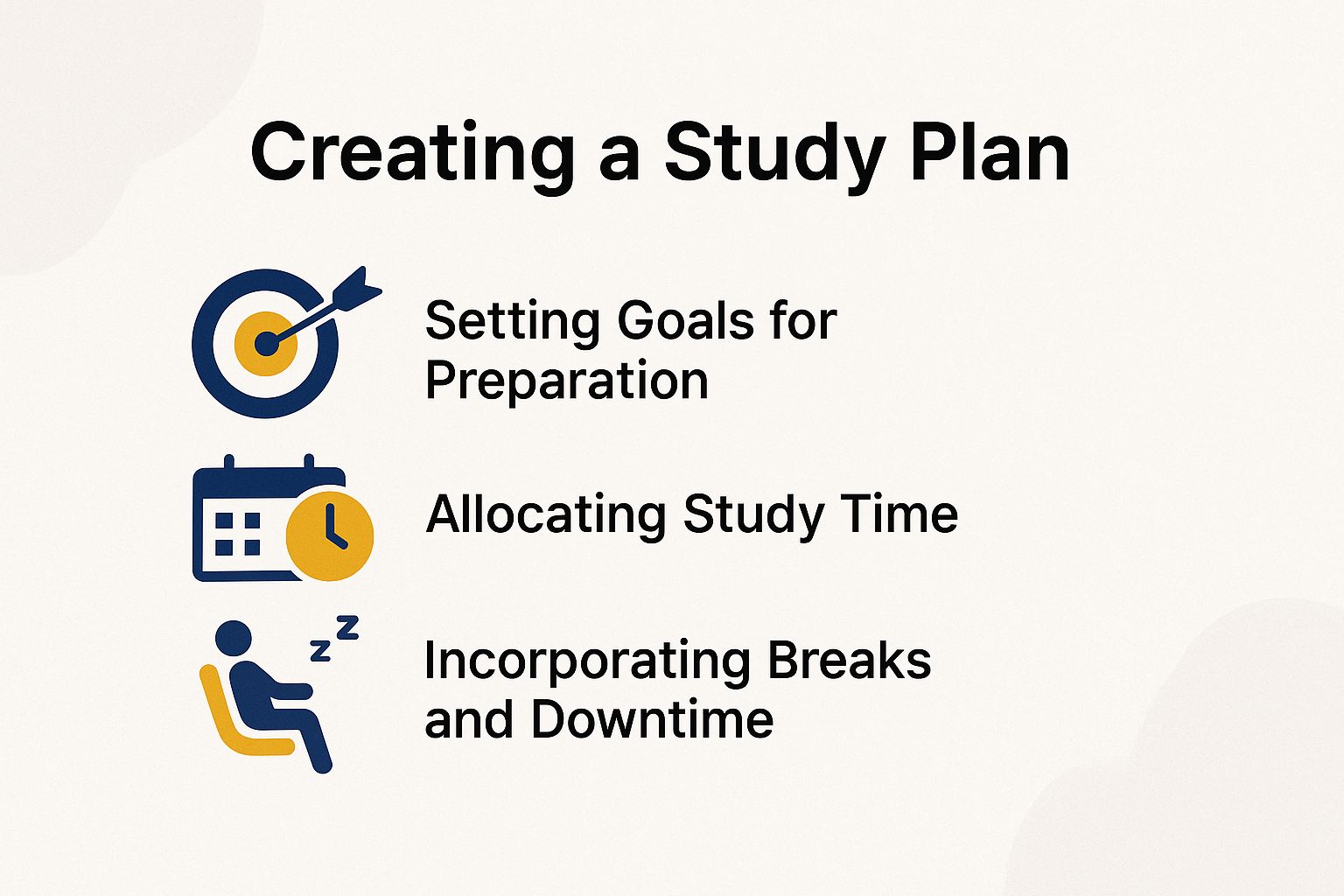
A well-structured study plan serves as the foundation for effective preparation for the 11 Plus, ensuring that students comprehensively cover all subjects. For an extensive guide on organising your revision sessions effectively, consider this 11+ weekly study timetable.
This organised approach helps to facilitate learning and instils confidence as they progress through their studies.
Setting Goals for Preparation
Setting SMART (Specific, Measurable, Achievable, Relevant, Time-bound) goals for 11 Plus preparation can significantly enhance both focus and motivation.
For instance, a specific goal might be to “complete three maths practice papers by the end of each week.” To ensure this goal is measurable, it helps to track not only your scores but also the time taken for each paper.
An achievable goal could involve gradually increasing the difficulty of the practice papers to align better with the exam standards. It is also important to keep the goals relevant by focusing on subjects that require the most improvement, such as verbal reasoning.
Additionally, making the goals time-bound by setting deadlines for each stage—like reviewing mistakes every Sunday—creates a structured approach that promotes consistent progress and motivation.
Allocating Study Time
A strategic approach to allocating study time can greatly enhance productivity and ensure that all subjects receive adequate attention before the exam.
To create an effective study timetable, begin by assessing your total available study hours each week, with an ideal target of 15 to 20 hours. Next, break this time down by assigning hours to each subject based on your proficiency and the proximity of the exams. It is advisable to prioritise more challenging subjects, allocating about 60% of your study time to them, while dedicating the remaining 40% to the easier ones.
Utilising tools like Google Calendar or Notion can help you organise your study sessions efficiently. Aim to study in focused 25- to 30-minute blocks, interspersed with 5-minute breaks, following the Pomodoro Technique. This approach not only enhances information retention but also helps maintain motivation throughout your study period.
Incorporating Breaks and Downtime
Incorporating regular breaks into study routines can significantly enhance retention and help prevent burnout during intensive 11 Plus preparation.
One effective strategy for managing study time is the Pomodoro Technique. This method involves dividing study sessions into 25-minute blocks, followed by a 5-minute break. After completing four cycles, it is advisable to take a longer break of 15 to 30 minutes.
These intervals not only improve focus but also provide opportunities for mental resets. Engaging in leisure activities during these longer breaks, such as taking a walk or practising mindfulness, can further refresh the mind, ultimately boosting overall productivity during study sessions.
Resources for Preparation
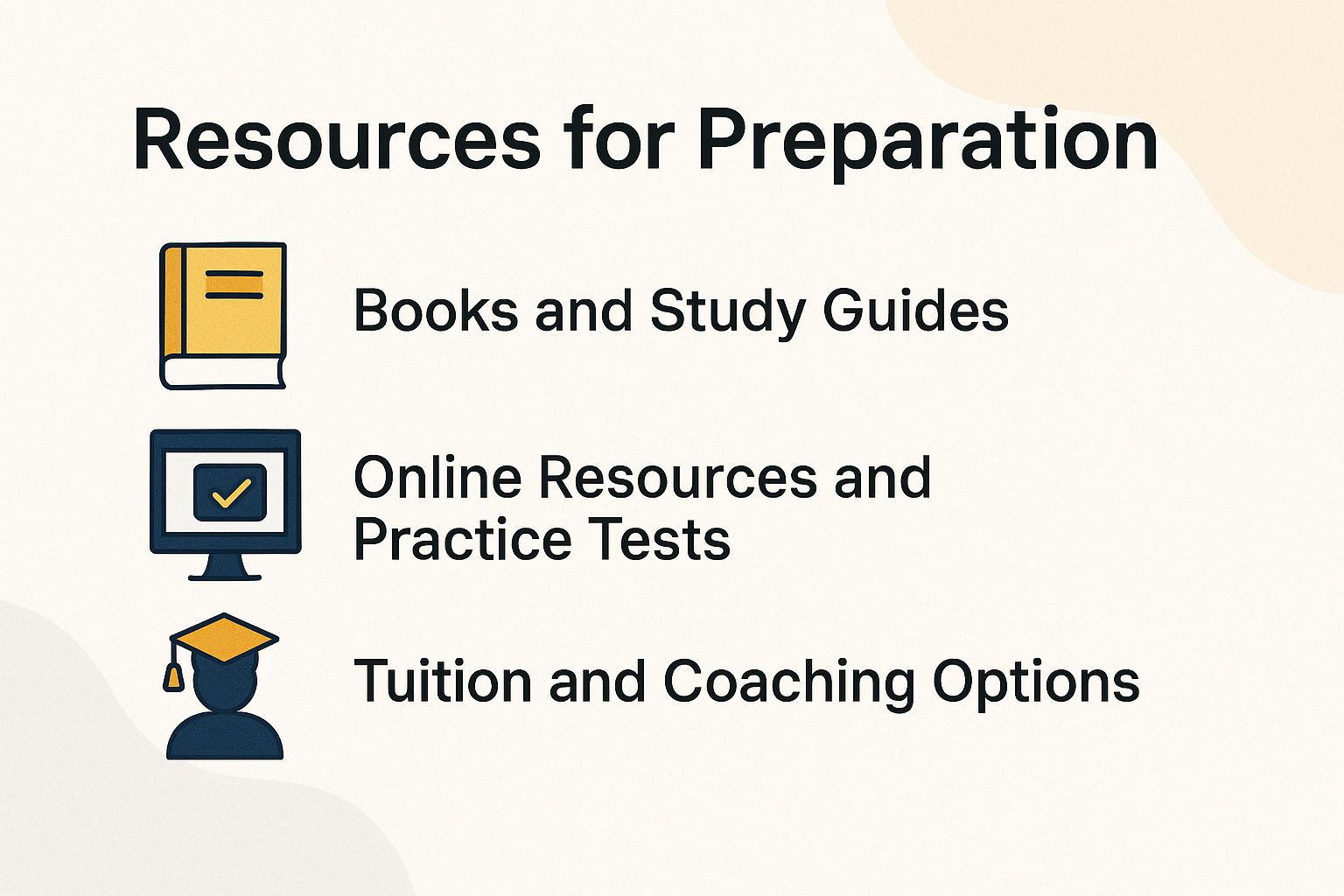
Utilising high-quality educational resources is essential for effective 11 Plus preparation, as it equips students with the necessary tools to achieve success.
Related insight: What Should Be in an 11 Plus Study Plan? provides valuable information on structuring your approach effectively.
Books and Study Guides
A selection of well-reviewed books and study guides can offer valuable insights into the structure and types of questions found in the 11 Plus exam. Here are some top recommendations:
‘The 11+ Guide’ by Andrew K. (approximately £19.99 on Amazon) provides a thorough breakdown of the exam format along with practice questions.
’11+ Verbal Reasoning for Beginners’ by CGP Books (£14.95) is an excellent resource for building foundational skills.
For mathematics practice, ’11+ Maths Practice Papers’ by Collins (£10.99) includes past papers along with detailed explanations.
Lastly, ‘The Complete Guide to 11+ Success’ by Ellen H. (around £15) offers a combination of tips and techniques for effective study.
Utilising these resources can significantly enhance your preparation strategy for the exam.
Online Resources and Practice Tests
Online platforms present a wealth of practice tests and resources designed to simulate the 11 Plus experience and improve learning engagement.
One option to consider is Atom Learning, which offers a comprehensive suite of interactive tests along with detailed performance analytics for £59 per year.
Another excellent choice is CEM 11 Plus, which provides access to actual past papers and study guides for £30 per set.
For those seeking a free alternative, 11Plus.com is worth exploring. This site features a variety of sample tests and user-generated content.
These platforms not only help users become familiar with test formats but also offer personalised feedback, effectively guiding their study approach.
Tuition and Coaching Options
Enrolling in tutoring or coaching programmes can offer personalised support and targeted learning strategies for 11 Plus preparation.
There are several effective options available for personalised tutoring.
Online platforms like Tutorful provide tailored sessions, starting at approximately £20 per hour, which allows for flexible scheduling to suit your needs.
In-person services, such as Kumon, offer structured programmes that focus on maths and English, typically costing around £140 per month.
For a more individualised approach, hiring a private tutor might be a better fit. A private tutor can design a customised learning plan for your child, with rates ranging from £25 to £50 per hour.
These services are specifically tailored to address your child’s unique strengths and weaknesses, ensuring an efficient and effective preparation process.
Effective Study Techniques
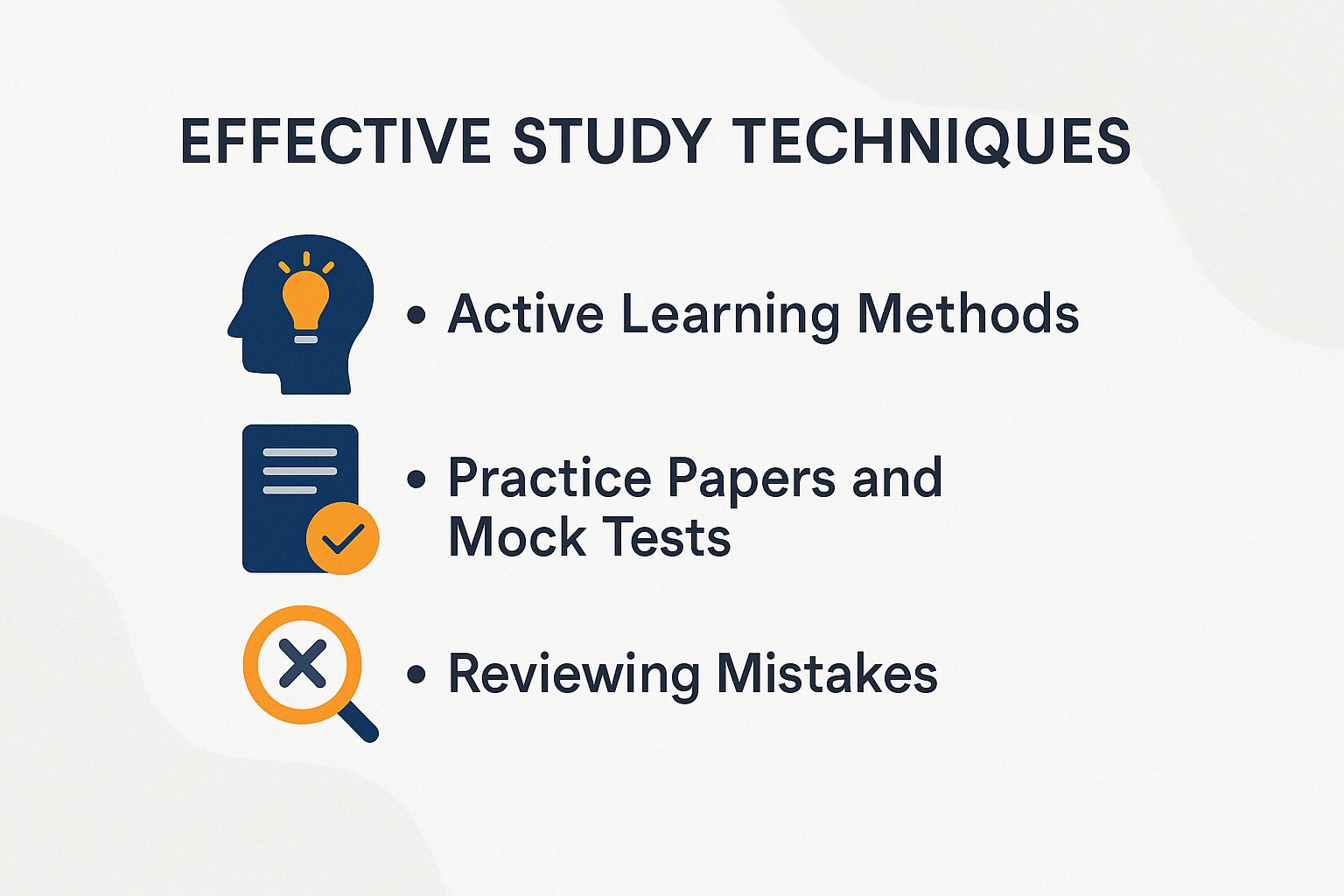
Utilising effective study techniques can greatly improve both retention and comprehension of the material required for the 11 Plus exam.
Worth exploring: 11+ Comprehension Tips: How to Help Your Child Succeed, which offers in-depth strategies tailored to this exam.
Active Learning Methods
Active learning techniques, such as teaching back concepts or utilising flashcards, can significantly enhance comprehension and recall for 11 Plus subjects. To implement these strategies effectively, it is beneficial to organise study sessions in which students teach each other key concepts, thereby reinforcing their understanding.
Flashcards can be easily created using apps like Anki or Quizlet, enabling learners to quiz themselves on a regular basis. Additionally, incorporating practice tests is an effective method; using past papers can help familiarise students with the exam format. Scheduling these practice tests weekly can provide valuable insights into their progress.
Group discussions also play a vital role in encouraging diverse thinking, as they allow students to explore multiple perspectives on challenging topics. This combination of techniques not only fosters a deeper understanding but also improves retention of the material.
Practice Papers and Mock Tests
Regularly completing practice papers and mock tests is essential for familiarising students with exam conditions and enhancing their time management skills. To prepare effectively, students should consider scheduling practice tests every two weeks, gradually increasing the frequency to once a week as the exam date approaches.
It is advisable to aim for at least five full-length practice papers before the exam. After each test, students should analyse their results by reviewing incorrect answers, identifying patterns in their mistakes, and noting the topics that require improvement.
Utilising tools like ExamSoft or the official exam app can aid in tracking progress and simulating actual test conditions, thereby ensuring a comprehensive preparation strategy.
Reviewing Mistakes
Analysing mistakes made during practice tests can offer valuable insights and help shape effective revision strategies for the 11 Plus exam.
To review your mistakes thoroughly, it is beneficial to maintain a mistake log where you can document each error alongside the question type and topic. This can easily be organised using a simple spreadsheet.
Next, categorise the errors you encounter: are they the result of misunderstanding the question, careless mistakes, or gaps in knowledge?
For issues that seem to recur frequently, it is advisable to dedicate focused revision sessions to those specific topics or question types. Make use of resources such as past papers and revision guides tailored for the 11 Plus exam to practise similar questions.
This approach will reinforce your understanding and enhance your confidence as you prepare.
Time Management Strategies
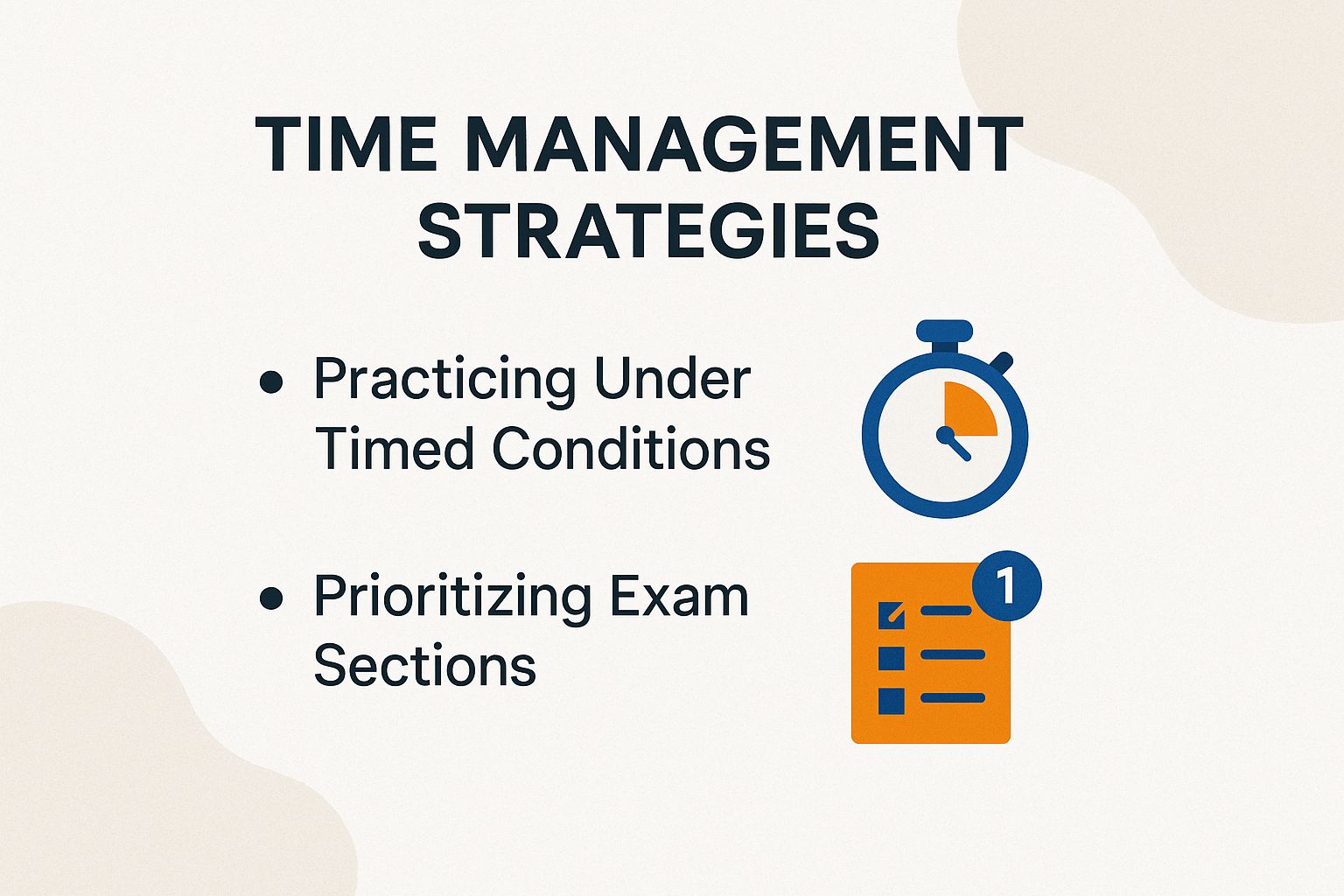
Effective time management strategies are crucial during exam preparation. By implementing these strategies, students can enhance their study efficiency and improve their overall performance.
Curious about the specifics of exam prep? Our 7+ Exam Guide provides everything you need to know to succeed.
Practising Under Timed Conditions
Practising under timed conditions is essential for students, as it helps them develop critical pacing skills necessary for success in the 11 Plus exam. To create an effective timed practice environment at home, it is advisable to designate specific time limits for each subject’s mock exams.
For instance, consider allocating:
- 45 minutes for mathematics,
- 30 minutes for English comprehension,
- 25 minutes for verbal reasoning.
Utilising a reliable timer or a simple smartphone application can help keep track of time effectively. Encouraging regular practice is key; aim to schedule sessions three times a week while gradually increasing the difficulty of the material.
After each session, it is beneficial to review the answers with your child. Focus on time management and identify areas for improvement. This feedback loop not only enhances learning but also reinforces essential pacing skills.
Prioritising Exam Sections
Identifying which sections of the exam to prioritise based on individual strengths can significantly enhance the effectiveness of your study time. To evaluate your strengths and weaknesses, it is advisable to begin with a diagnostic test. This will help you pinpoint areas where you excel and those that require further attention.
For instance, if you notice that your performance in maths is substantially lower than in reading, it would be wise to allocate additional study hours to maths.
Utilising tools such as Quizlet can be beneficial for creating topic-specific flashcards, while Khan Academy provides targeted practice exercises. It is important to analyse your progress on a weekly basis and adjust your study plan as needed.
Should you find that your maths scores improve, consider shifting your focus to weaker topics or incorporating practice exams to further enhance your overall preparation.
Day Before the Mock Exam
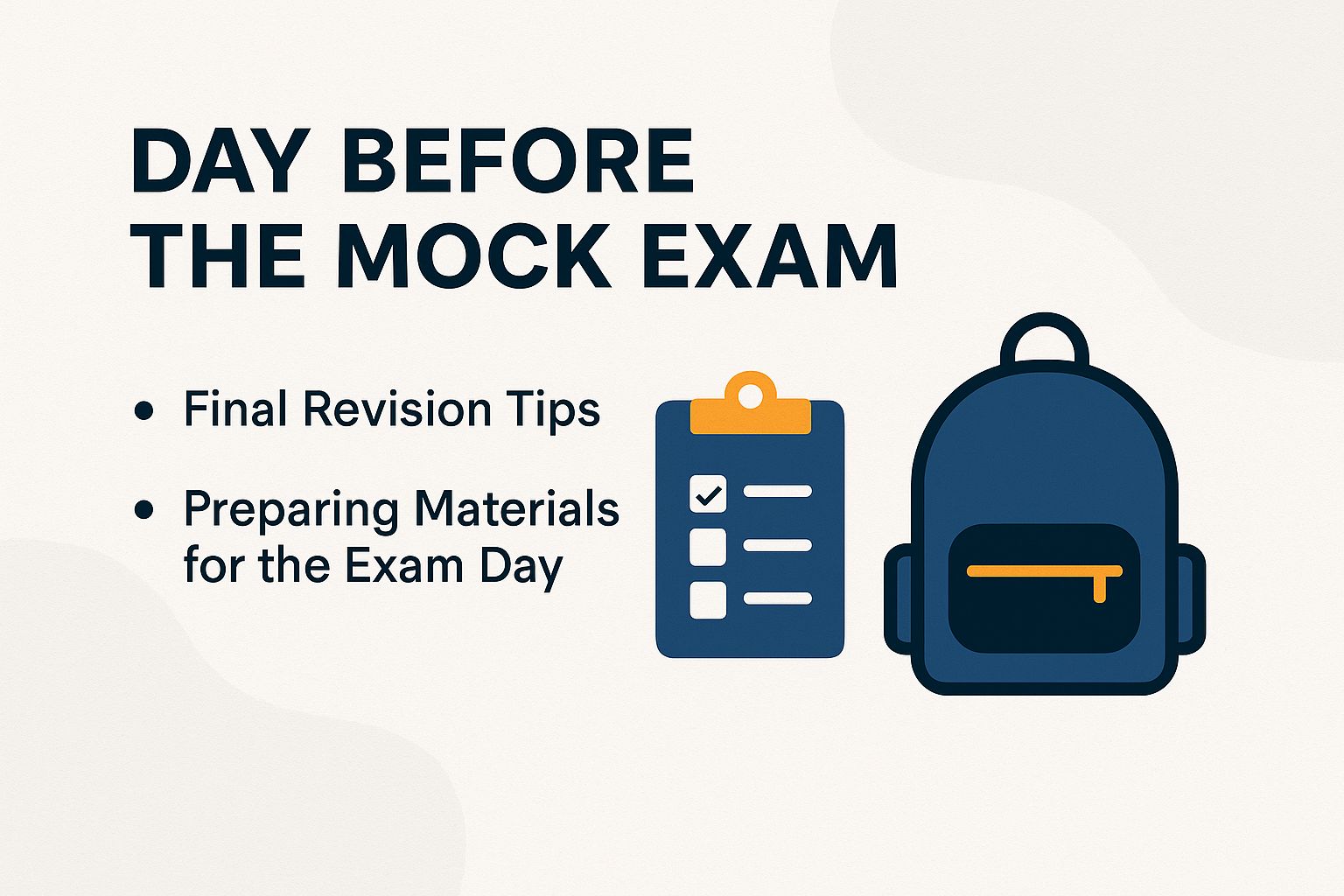
The day before the mock exam is essential for ensuring that students are both mentally and physically prepared for the assessment that lies ahead.
Final Revision Tips
The final revision the day before the exam should concentrate on reinforcing key concepts instead of attempting to learn new material. To effectively strengthen your understanding, begin by summarising your essential notes and creating concise flashcards for quick reference.
Engaging in practice tests can simulate exam conditions, which may enhance both retention and confidence. Additionally, incorporating relaxation techniques, such as deep breathing or meditation, can help reduce stress levels prior to the exam.
It is advisable to aim for at least 30 minutes of focused review time, with short breaks in between. These strategies not only help solidify your knowledge but also maintain clarity and focus as you prepare for the following day.
Preparing Materials for the Exam Day
Preparing your materials and organising everything the night before can significantly reduce stress and contribute to a smoother exam day experience. To enhance your readiness, it is advisable to create a checklist the evening prior. This checklist should include essential items such as:
- Your exam stationery
- A valid form of identification
- Water
- Snacks
Additionally, laying out your clothes the night before can help you avoid any indecision in the morning. Ensure that all necessary technology, such as calculators or laptops, is fully charged. It’s also wise to plan your route to the exam venue, allowing extra travel time in case of unexpected delays. Setting an alarm to wake up at least an hour earlier than usual can provide you with a helpful buffer for any last-minute adjustments.
Frequently Asked Questions
What is the purpose of 11 Plus mock exams?
The purpose of 11 Plus mock exams is to help students prepare for the actual 11 Plus exam by simulating the test conditions and familiarising them with the types of questions and format of the exam.
When should I start preparing for 11 Plus mock exams?
It is recommended to start preparing for 11 Plus mock exams at least 6-12 months before the actual exam date. This will give you enough time to familiarise yourself with the material and identify areas that need improvement.
What are the key elements to focus on while preparing for 11 Plus mock exams?
The key elements to focus on while preparing for 11 Plus mock exams include time management, understanding the question types, and practising under timed conditions. It is also important to work on improving your weaker areas and using mock exams as a way to monitor your progress.
How can I create an effective study plan for 11 Plus mock exams?
An effective study plan for 11 Plus mock exams should include a balance of all the subject areas, regular practice under timed conditions, and identifying and addressing any weak areas. It is also important to set realistic goals and review your progress regularly to make necessary adjustments to your study plan.
What are some useful resources for 11 Plus mock exam preparation?
There are many useful resources for 11 Plus mock exam preparation, including past papers, practice books, online practice tests, and private tutors. It is important to choose resources that align with your learning style and focus on quality over quantity.
How can I manage my stress and anxiety while preparing for 11 Plus mock exams?
To manage stress and anxiety while preparing for 11 Plus mock exams, it is important to maintain a healthy balance between studying and relaxing. Make sure to take breaks and engage in activities you enjoy. It is also helpful to talk to someone about your worries and seek support from friends and family. Remember to stay positive and confident in your abilities.



